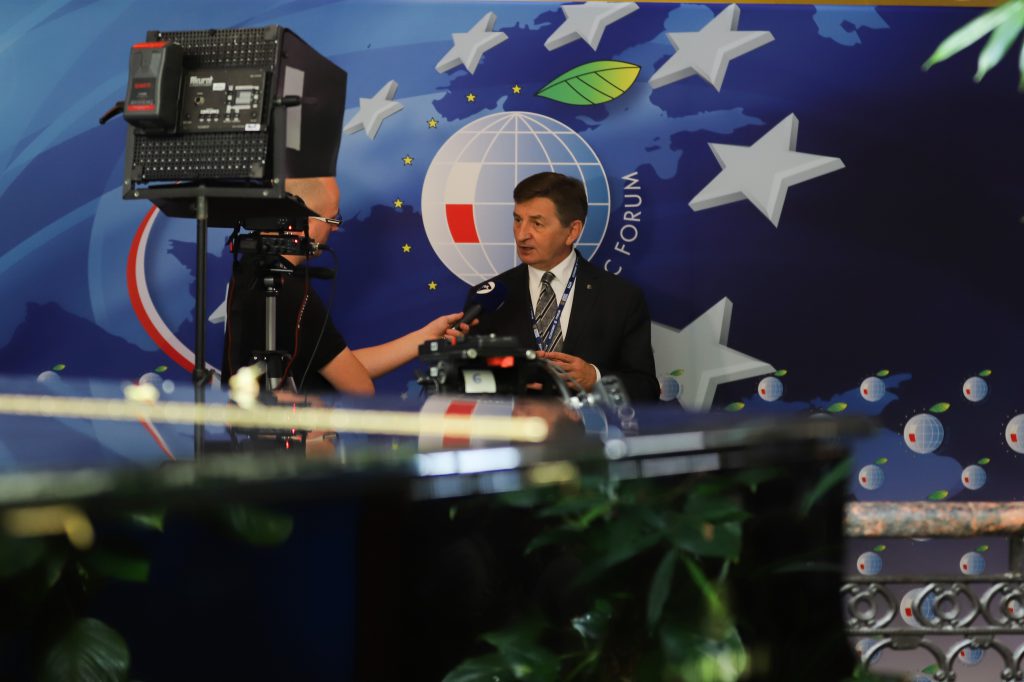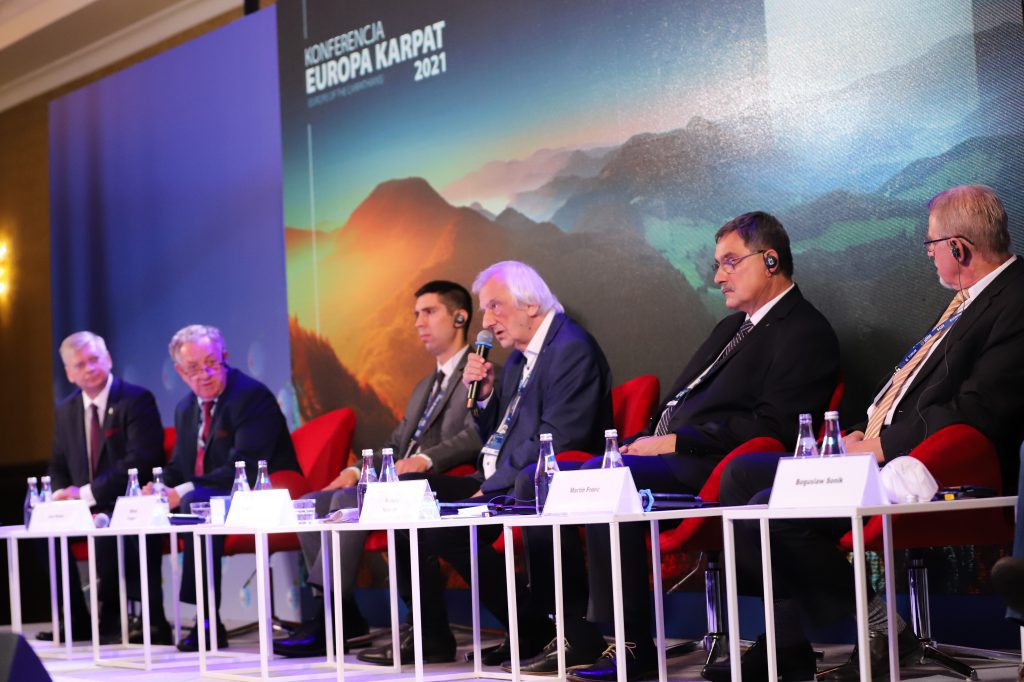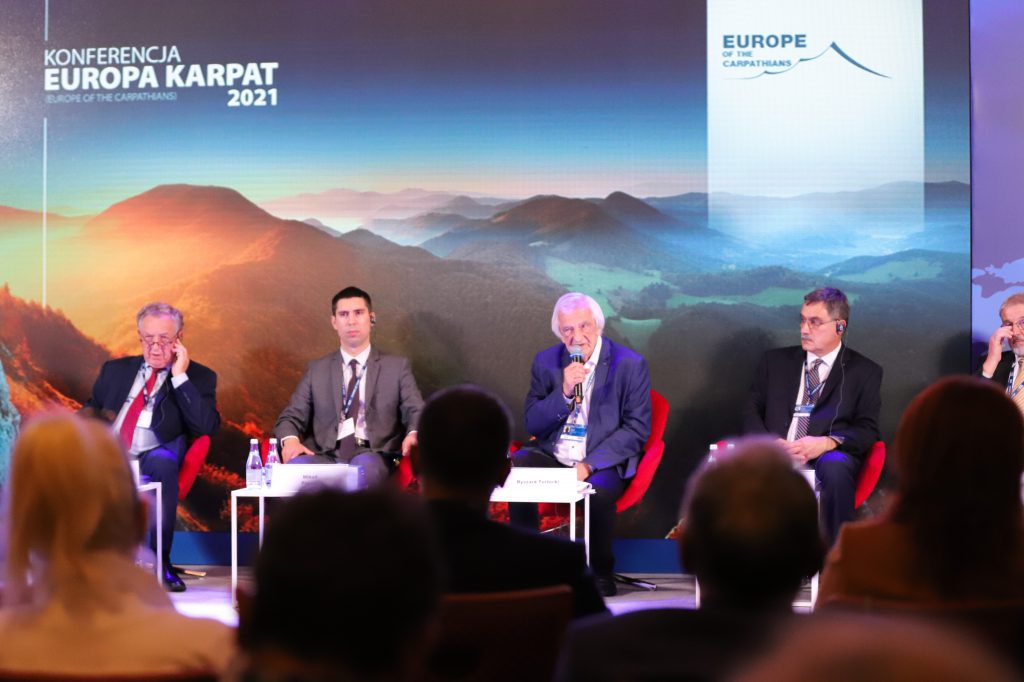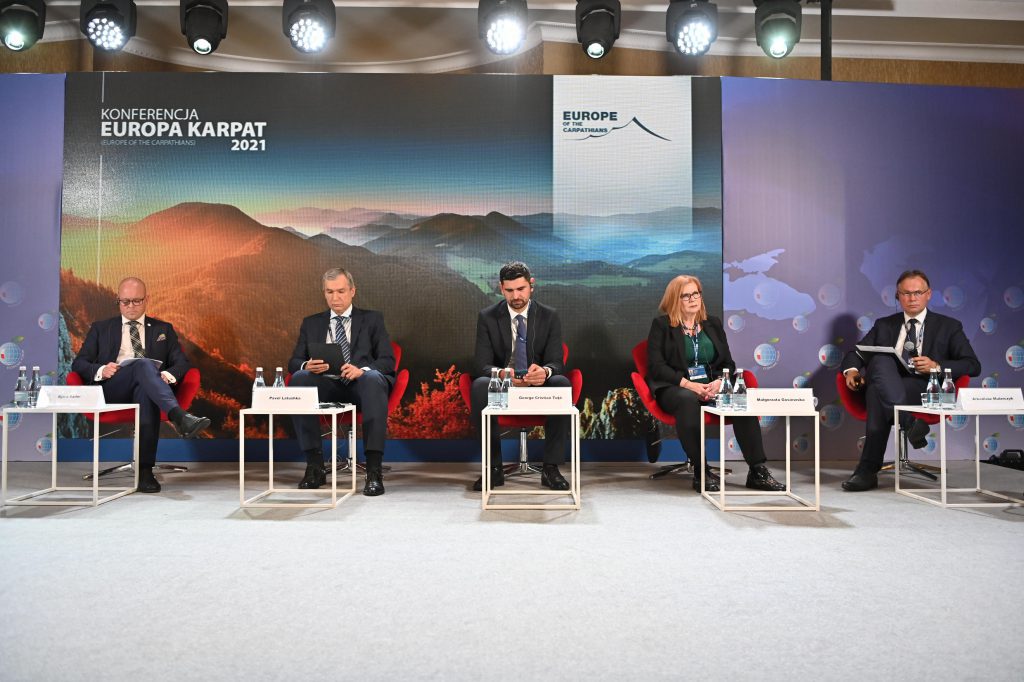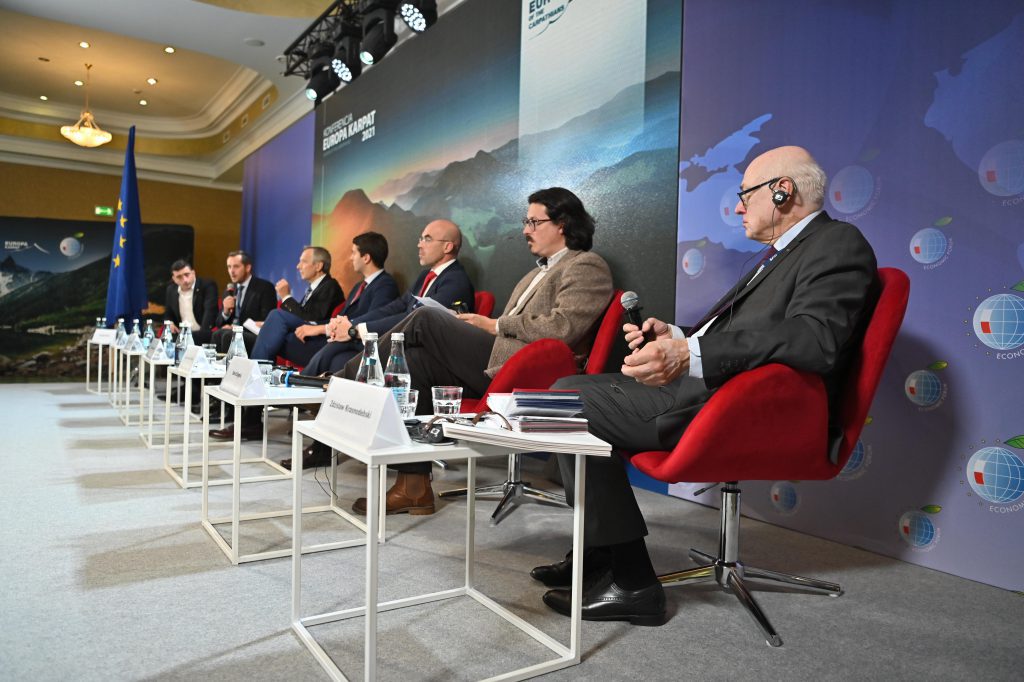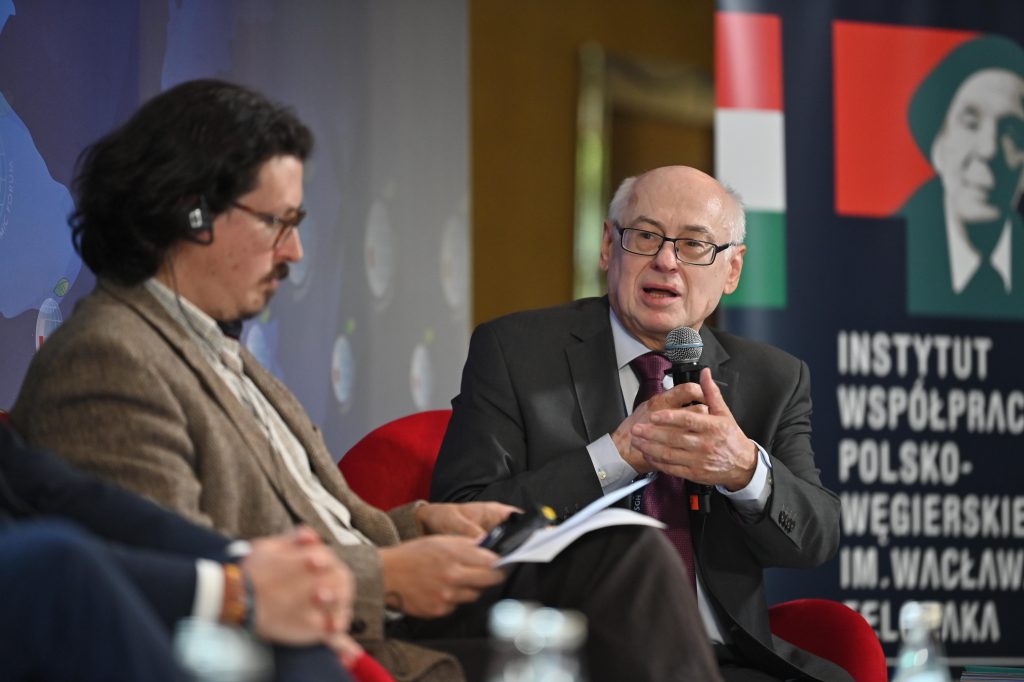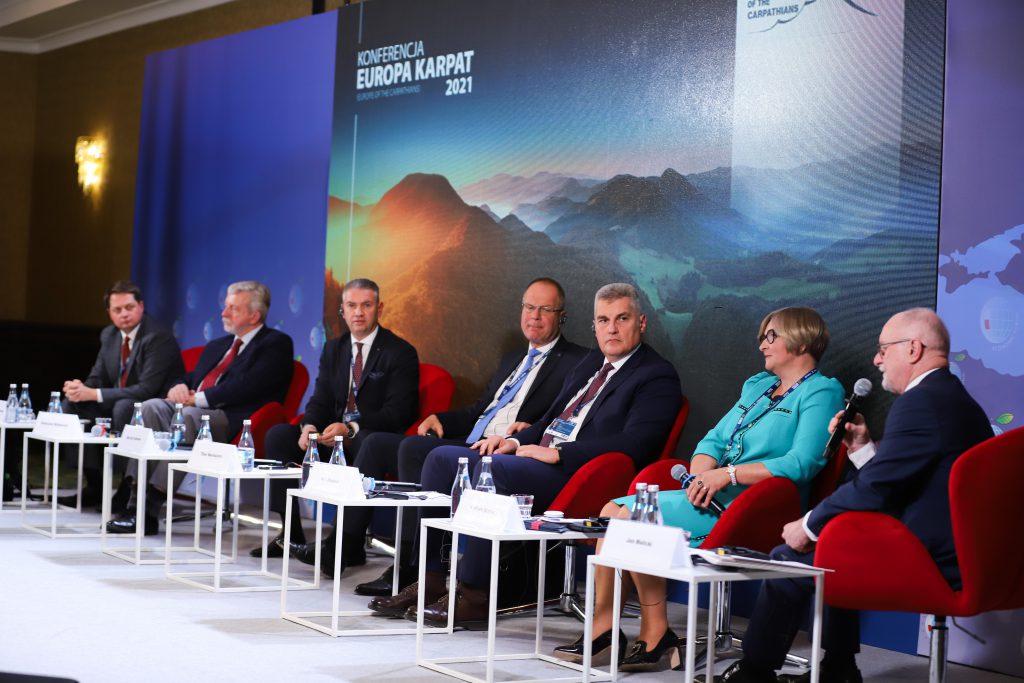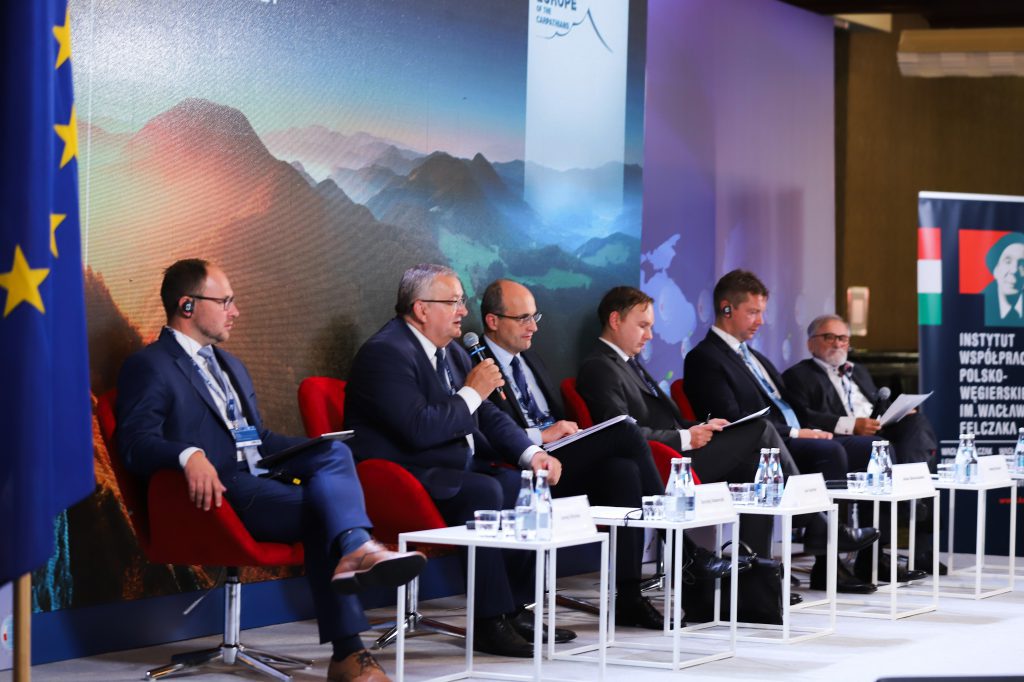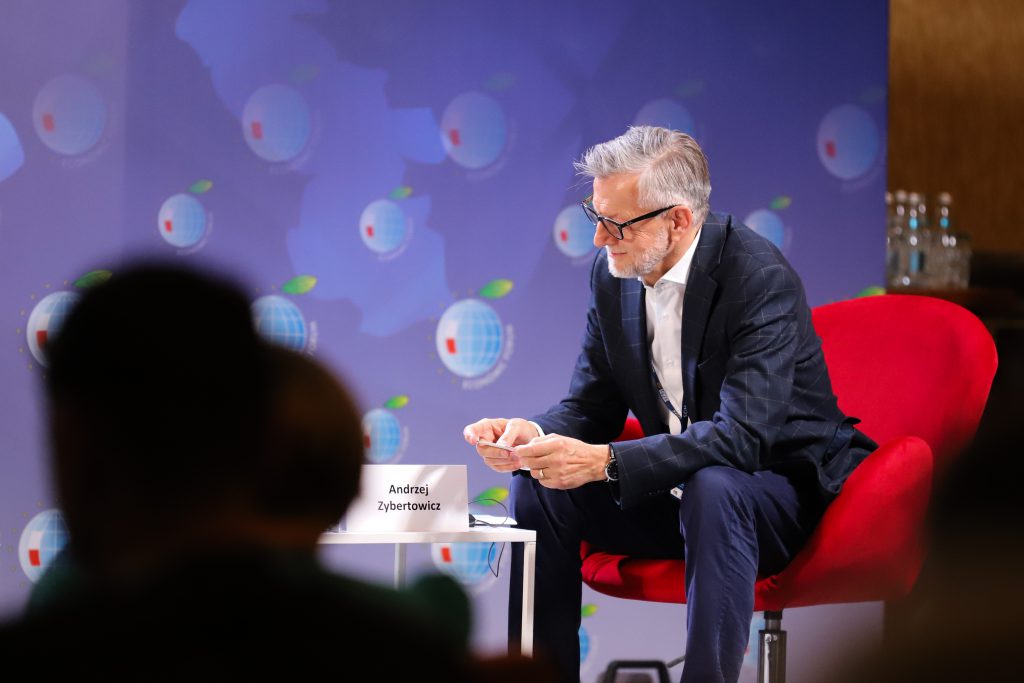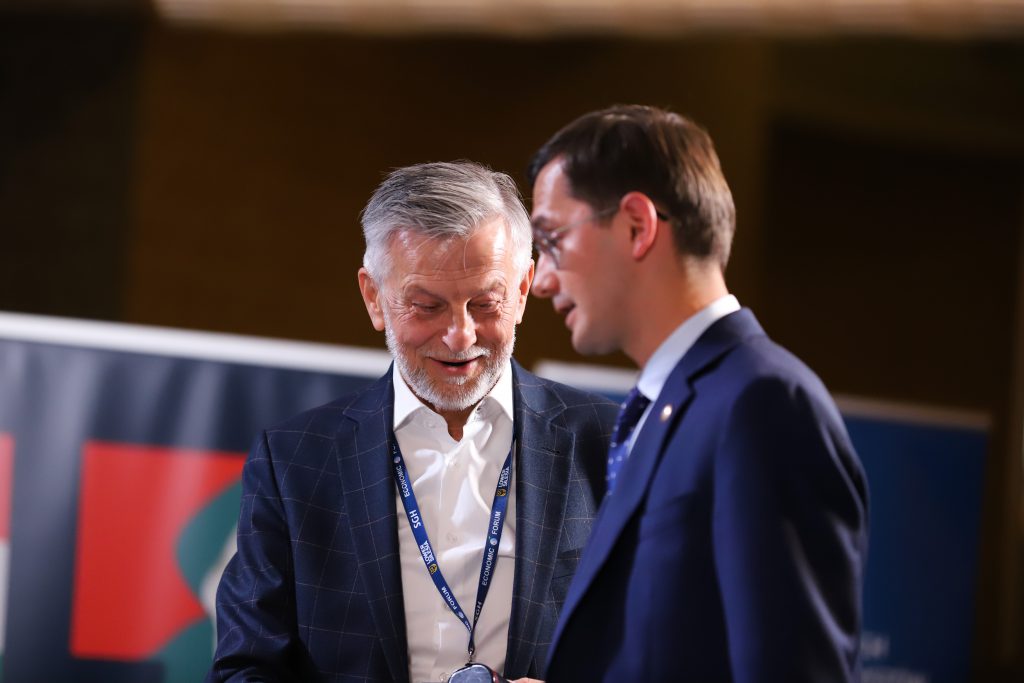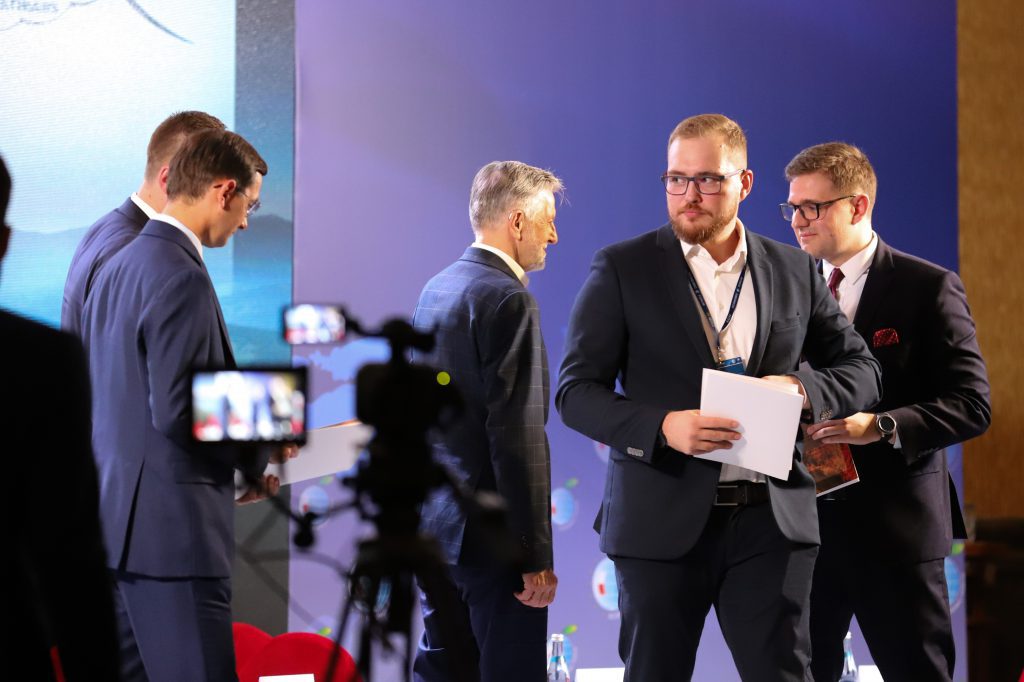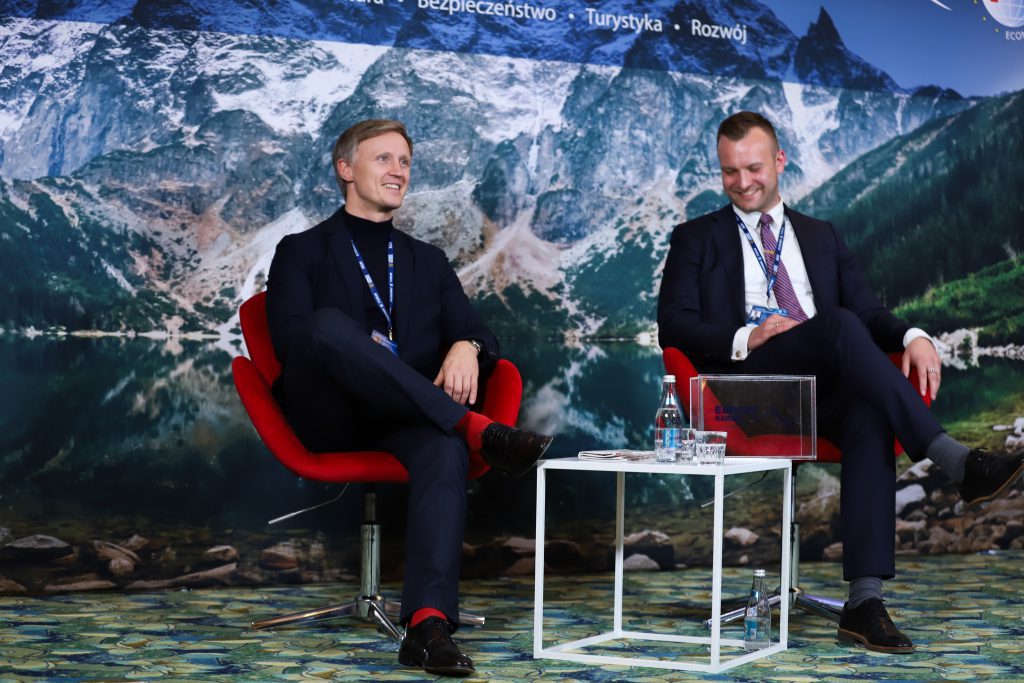On Wednesday, September 8, within the framework of the second day of the Conference "Carpathian Europe" a discussion was held about the European Green Deal as an opportunity for the environment and organic farming. Regional cooperation, technological development and visions for Europe were also discussed. The organizer of the event is the Chancellery of the Sejm, and the partner of the Conference is the Wacław Felczak Institute for Polish-Hungarian Cooperation.
30 Years of Free Central European States and Building Regional Cooperation
Representatives of Poland, Lithuania, Czech Republic, Slovakia, Hungary and Moldova were among the participants in Wednesday's first panel. The panelists debated on cooperation in the region over the past three decades, common goals and challenges.
The discussion was opened by Ryszard Terlecki, Deputy Speaker of the Sejm. - We have very good ideas such as V4, Tri-City. Our cooperation in the region is developing. However, there are several problems that we face. On the one hand, it is a question of accession to the EU of countries that aspire to join it, and the EU does not want to accept new countries. This is a very big problem for the aspirant states, as some of them have already fulfilled the EU's expectations. Impatience is growing in these countries - assessed Ryszard Terlecki, who added that the idea of building one country and a two- or even three-speed Europe is growing in the EU. - We must cooperate. We have common interests regardless of political orientation. In the eastern part of Europe we also face the problem of decadence, attempts to destroy the values upon which civilization was built," said the Deputy Speaker of the Sejm.
In turn, Deputy Speaker of the Moldovan Parliament Mihail Popșoi assessed that his country is on the path to democracy and European integration. - We have strong partners in the EU, whom we trust. They see the importance of Moldova's European integration. We want to create such conditions to become a part of the European family. If you ask Moldovans, there is no alternative, the strategy is clear, European integration is perceived as a guarantee of development, democratic consolidation, it is part of our political DNA. When President Andrzej Duda visited Moldova a few days ago and took part in the celebration of Moldova's Independence Day, it was something extremely important for us, we saw support in the region, in the EU. We want to build stronger and stronger cooperation with Poland - emphasized the Moldovan politician.
- For me it is a symbolic event. Carpathian Europe shows what a new sense of cooperation of the Visegrad Four looks like. Local cooperation has shown what true subsidiarity is. In Brussels, elites live isolated from reality and a democratic deficit is created. In the case of Carpathian Europe, the opposite is true. It is a bottom-up initiative that brings results. Thanks to these conferences we have shed a stronger light on the backward eastern regions - said another participant of this panel Richárd Hörcsik, Chairman of the EU Affairs Committee of the Hungarian National Assembly.
On the other hand, Martin Fronc, former Minister of Education and Science of Slovakia, said that he had a positive view of the EU project. - It brought benefits to our countries. The fact that we benefit from it does not mean that we will not speak openly about problems that occur in the functioning of the EU. Problems in Europe are solved through discussion, we have a common tradition, history. It is worth considering a formal expansion of the V4 group. We appreciate Poland's initiatives - he added.
Bogusław Sonik, a member of the Sejm and Senate Delegation to the Parliamentary Assembly of the Council of Europe, stressed that he was a supporter of regional cooperation. - Nothing stands in the way of introducing such a degree of speed that we set for ourselves. The most important thing is to define common interests and speak with an agreed voice, to undertake specific projects - he said.
Emanuelis Zingeris, a member of the Foreign Affairs Committee of the Lithuanian Seimas also took the floor during the discussion in this part of the conference. - We have to use the legacy of the Polish-Lithuanian Commonwealth to build the European Union, to defend democratic values - he stressed.
Jan Draus, the chairman of the IPN Collegium, summed up the discussion in this panel.
The discussion of the first part of today's session was moderated by Maciej Szymanowski, Director of the Wacław Felczak Institute for Polish-Hungarian Cooperation.
European Neighbourhood Policy
The second panel discussed, among other things, the Eastern and Southern dimensions of the European Neighbourhood Policy, similarities and contentious issues, as well as humanitarian and development aid and the involvement of countries in solving the immigration crisis, including the protection of the EU's external borders.
The discussion in this panel was inaugurated by the speech of the Deputy Speaker of the Sejm Małgorzata Gosiewska. - We have a change. And this is a good signal in the EU migration policy. It means acceptance of the Polish position. We are talking about refugees and economic migrants from Ukraine, who enrich our country, who are needed. The problem that is growing is a wave of migrants, or hard to define people, who are on the border with Belarus - said Deputy Speaker Gosiewska. - What is happening in Ukraine, Donbass, and Belarus shows the disarray of institutions, international organizations, such as the International Committee of the Red Cross, OSCE, and the softness of Western politicians. We know what is happening in the Russian Federation and in Belarus. In this part of Europe we have to talk about it all the more forcefully, cooperate all the more, and present a common voice in the international arena," said Deputy Speaker Gosiewska.
The Georgian perspective on the European Neighbourhood Policy was discussed by Maka Bochorishvili, the chairwoman of the commission dealing with European integration in the Georgian Parliament. - The Eastern Partnership is at this point a very diverse region, but it is also an opportunity for new openings. At the same time we observe the increasing presence of Russia in the region, we see how Russia's behavior affects security. We also observe the phenomenon of fatigue with the topic of EU enlargement. I am convinced that the future of Central Europe cannot be considered in isolation from the future of Europe as a whole. The issues of this region should be included in the EU strategy - she emphasized.
Björn Söder, member of the Riksdag Delegation to the OSCE and NATO IG, also spoke in the discussion. - From a Swedish perspective we have felt the migration influx in Europe very significantly. The migration crisis has changed Sweden and our society. Today we are among the countries with the highest level of gun crime. We have encountered a completely different culture. I am thankful that Poland and other countries show a very clear position in defending the borders of the Union,' said the member of the Swedish Parliament.
- Romania is an active and consistent ally of the idea of European integration. In this support we refer to our basic constitutional provisions, which talk about maintaining good neighborly relations with our neighbors. All institutions support the idea of maintaining good relations with our neighbors. In the East and in the South we still see serious migration and climate problems. We should act together", emphasized George-Cristian Tuță, member of the European Affairs Committee in the Romanian Parliament.
The discussion ended with a speech by Pavel Latushka from the Coordinating Council for the Transfer of Power in Belarus. - If we talk about the Eastern Neighbourhood Policy, it was aimed at developing cooperation with neighbouring countries for the EU. Today Lukashenka's regime has actually suspended its participation in the Eastern Partnership program, an illusory system of power sharing has been violated, there is no basis for the development of the Neighborhood Policy. The EU has no elaborated strategy to solve the crisis in Belarus. It is no longer just an internal crisis, but a European and regional one. This conflict is seen as a hybrid war with the EU. This is a test for the perseverance of the whole Europe - he said.
The discussion was moderated by Arkadiusz Mularczyk, Chairman of the Sejm and Senate Delegation to the Parliamentary Assembly of the Council of Europe.
The impact of the Green Deal on transport policy in Central Europe
In this item, the panelists debated about the European Green Deal, among other things, in the context of creating a sustainable transport system in the Carpathian region.
- Without effective infrastructure there can be no modern, stable development of countries. In Poland, we are aware of this, hence the government is conducting activities aimed at increasing the efficiency of communications, especially roads, in our country. We have prepared a draft of a new national road and freeway construction programme, for which we will allocate EUR 65 billion. We have secured the sources of financing. These funds will be used, among others, to connect roads in Europe. Via Carpatia and express road S3 are examples of implemented projects - said the Minister of Infrastructure Andrzej Adamczyk in his speech opening the panel.
The Slovenian point of view was presented by the head of the Ministry of Infrastructure, Jernej Vrtovec. - Transport is a necessary sector if we want to achieve decarbonisation. This sector was hit by a pandemic, we need to rebuild it. We also want to create a network of trains that connect European capitals. We must prepare for future possible crises, our markets must be resilient," he said.
Andrej Doležal, Slovak Minister of Transport and Construction also took part in the discussion on European transport. - Via Carpatia is an extremely important project for the eastern part of Slovakia because of the potential economic growth. Moreover, I am convinced that we will build not only a high-speed railroad between the V4 countries, but that we will also be able to connect other countries, such as Lithuania and Slovenia, which will create a broader corridor of high-speed railroad - he said.
Deputy Minister of Transport of the Czech Republic Jan Sechter pointed out the unanimity of the Visegrad Group regarding the Green Transport. - Transport is decisive in the economy, for example in terms of mobility, labour market. At the same time high speed rail translates into the competitiveness of the entire economy, freight transport. This is Visegrad project no. 1 - assessed the Czech politician.
Mustafa Nayyem, Member of the Verkhovna Rada of Ukraine, presented information about Ukraine's preparations for the Green Deal. - We are trying to promote clean and efficient means of transport, we are developing a draft law on decarbonization and reduction of emissions of harmful substances by means of transport. At the same time we are gradually banning the use of certain types of combustion engines in public transport. We also cooperate with the Polish side, our infrastructure is ready to provide adequate traffic between Poland and Ukraine - he said.
Lithuanian Deputy Minister of Transport and Communications Julius Skačkauskas welcomed the joint agreement in the discussion to treat roads and railroads as complementary. - We cannot talk about either one or the other. Via Baltica is the largest infrastructure project, where we are building high-speed rail connections between Tallinn, Riga, Vilnius and Warsaw. We are glad that also in Visegrád between Poland, Slovakia, the Czech Republic and Hungary such a project is in progress - he noted.
The discussion was led by Włodzimierz Zientarski, a motoring journalist and the President of the Kierowca.pl Association.
Future Europe open or closed?
During this panel, the guests of the 30th "Carpathian Europe" from Poland, Romania, Montenegro, Belarus discussed, among other things, the challenges of the future for the Carpathian region, the search for compromise between the postulates of greater integration and the concept of Europe of solidary and sovereign states.
- We should seek to balance the opening of Europe to third markets, from East Asia. Europe, which joined the EU in 2004, found itself in a situation where everything had basically been done in the Chinese context. We had to catch up. Central and Eastern Europe has taken steps in opening up to China. There is a wider opening of the whole region. An example is Hungary, where last year the largest investor was South Korea - said Dominik Mierzejewski from the University of Łódź.
A representative of the Free Belarusian University also spoke at the panel. - We all dream of an open Europe. It is not only cooperation and development, but also independence. If Europe closed itself, there would be no chance for preserving the sovereignty of Belarus due to the neighboring Moscow neo-imperium. Besides the fact that Europe should be open to the countries, which are ready, it is very important for us to be ready and willing to join the European values and standards,' said Alexander Milinkevich.
What should the future Europe be like - open or closed? Ben-Oni Ardelean, Vice Chairman of the Foreign Policy Committee of the Chamber of Deputies of Romania, also answered this question. - We must support further enlargement of the EU and not only because we have an external border. Further integration process is needed. Of course, there are compromises to be made. We cannot allow the aspiring countries to end up in some kind of an in-between zone - he said.
Tibor Navracsics, former Hungarian EU Commissioner for Education, Culture, Youth and Sport, agreed that Europe should remain open. - However, what is happening inside the EU is questionable. As a result of opening and enlargement, the EU is becoming more and more confusing and complicated in terms of its internal structure. In addition, there may be such enlargements, e.g. to the east, which may violate the structural uniformity - said the Hungarian politician.
Montenegro's perspective was provided by Ivan Brajović, member of the Security and Defense Committee. - Brexit was the first moment when Europeans saw a warning signal, when the public said no. We need to introduce new quality so that everyone feels good in Europe. As a non-EU country, we support integration processes. We are the most advanced among the aspiring countries," he said.
The Chairwoman of the Delegation of the Sejm and the Senate to the OSCE, Barbara Bartuś, also spoke at this point. - A few years ago we had an invasion of immigrants, Europe was very open. It was only Poland and Hungary who said that this cannot be. And we were right. Today we have an attempt to repeat this situation. At the same time, the Polish government is very supportive of integration; we have always supported cooperation, which is particularly necessary in the economic dimension. We must think about what this Union should be like, we must learn from Brexit. Let us return to the foundations. Cooperation and not imposing the will of the stronger - emphasized Ms. Bartuś.
Croatian chairman of the Commission for European Affairs Domagoj Hajduković noted that through the pandemic and as a result of migratory movements, the world and Europe have changed forever. - This is no longer Schuman's Europe, it is a completely different continent - he said. - If Europe was to be closed, there is no future for it. The European project has been an open project from the very beginning and I am convinced that it is still so. We are and will be one of the greatest supporters of the inclusion of both Montenegro and other countries - he added.
David Usupashvili, member of the Commission on European Integration expressed his belief that most Georgians believe that Europe should remain open. - This is not a political issue, but an existential one. Closing Europe is not a solution. We also see a certain need for changes in the institutional set-up.
President of the Transformation Center for Ukraine Mykhailo Khariy expressed hope that Europe will remain open. - We want to remain a part of this openness. We also want to use the American experience when it comes to systemic transformation. Last week, the presidents of the United States and Ukraine held a meeting. A joint statement on strategic partnership was signed. It was stated that the Ukrainian success is centrally important for the global success of democracy - he said.
The discussion was moderated by Jan Malicki, Director of the Eastern European Studies at Warsaw University.
European Conservative Alliance - Joint Declaration
The panelists referred to the joint declaration of the leaders of European center-right parties. They also tried to answer the questions: On what principles should European cooperation be based? In which direction will the Union develop?
Nicolas Bay, French vice-president of the Identity and Democracy Group in the European Parliament, was the first to speak in the discussion. - Our nations have different histories, particular national peculiarities, therefore we are against European federalism, but also against centralized authoritarian power in Brussels. Our common history also includes difficult moments, but we have a common cultural foundation. There is Greek philosophy, Christianity - he said. - Whether we want it or not, there is migratory pressure on the European continent, demographic decline in Europe, and the gradual flight of industry. I am convinced that in fundamental matters related to the future of our nations we can act together. We are aware of the enormous challenges that we will have to take on, and which require joint action - he added.
- It is important that we understand our roots, identity, tradition. We need to make changes, reforms. This is a task for each generation. We have to adapt Europe to our times - said Ján Figel', member of the Board of the European Institute of Innovation and Technology.
According to MEP Jorge Buxadé Villalba, we are at the moment when those who defend the right to life, to shape the education of children, to preserve the environment are thrown out of the EU. - The elites and the bureaucracy of Brussels are in crisis. We have to defend ourselves, it is important that we have a common consciousness and act together, get to know each other better - said the Spanish politician.
- My generation hoped for a common Europe. We hoped for a Europe of freedom, prosperity, diversity. We don't see this today in Brussels," lamented Romanian MEP George Simion.
The Italian perspective was presented by Francesco Giubilei, founder of the Nazione Futura Movement. - In the West we don't understand what is being talked about in Eastern Europe. In the Visegrad region they think a little differently. When we talk about uniting conservative ideas we must first of all respect all governments that are democratically elected. If the parliament of a country passes a law, we have to accept it," he stressed.
David Engels, principal analyst at the Western Institute, concluded the discussion in this panel. - We need a united conservative front in Europe. This is how we can respond to the challenges. The Declaration on the Future of Europe should be seen as a first step, a starting point. It is necessary to establish a moral basis for the future Europe. We need to describe European identity - he said.
The moderator was Zdzisław Krasnodębski, Member of the European Parliament, Vice-Chairman of the Committee on Industry, Research and Energy (ITRE).
Digital Carpathian Europe. Security and economic leap, or why do we need new technologies?
The final panel of the second day of the conference focused on digital solutions in the security dimension, traditional and innovative industries.
The discussion in this panel was started by Aleksandra Przegalińska. She suggested taking a closer look at technological development. - Too little effort is put into positioning Europe in the technological race. Europe could benefit from its pluralism, play a very interesting role between technological giants such as the US or China - said the Vice-Chancellor of Kozminski University.
Reinis Znotiňđ, in turn, expressed his belief that each of the countries of the region, Poland, Lithuania, Latvia, Romania could create some great technological innovation that could change the landscape. A leading technology could be created in this way. If you look from a regulatory perspective, this is a perspective where we should be more united. Artificial intelligence regulations should be common and based on agreement among member states," noted the Latvian chairman of the Subcommittee on Information Technology and Innovative Enterprise of the Committee on Sustainable Development.
- If we're talking about a monocentric union, in business it's called micromanagement, which is never good. By contrast, innovations that come from lower-level employees solve real problems. The EU should take direction from this example," noted Vadim Melnyk, chief executive officer (CEO) of Dronehub.
A member of the Parliamentary Commission on Digitization, Innovation and New Technologies, MP Robert Gontarz, speaking in the discussion said that monocentrism is not exactly a good solution. - This form is always associated with bureaucracy, which always appears with central management. In the field of digitalization monocentrism is not good, it has to be bottom-up, broken down, then people will see what they really need - he said.
- There is no future for any national projects without an EU future. It is our best project that needs to be fought for. We need a new approach. In Europe we failed, we failed to create this common Silicon Valley, we failed to harness our human resources and economies to work so as to make the most of this polycentric approach - assessed Pavel Popescu, member of the Romanian parliament.
The discussion in the last panel of the second day of the conference was led by Andrzej Zybertowicz, advisor to the President of Poland.
text: Sejm Information Center
Photo: Marta Olejnik, Aleksander Zieliński/ Chancellery of the Sejm
Conference rebroadcast: YouTube
